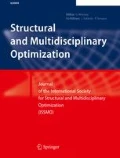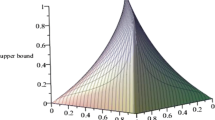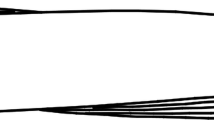Abstract
Many structural systems require a minimal number of components to be operational, and predicting the reliability of such systems is a challenge because surviving components share the original system workload with higher component loads after the failure of some components. The states of all the components are also dependent. Such dependence, however, is generally neglected in many existing methods. In this study, we develop a new reliability method for systems with dependent components that share the system load equally before and after other components have failed. The components are also subjected to other loads, such as a preload. The new method is based on limit-state functions that predict the states of components, and the First Order Reliability Method is used. The advantage of the proposed method is that it can directly link the system reliability with design variables and random parameters because of the use of a physics-based approach. High accuracy is maintained with the consideration of dependent component states. Two examples are used to demonstrate the good accuracy and efficiency of the proposed method.




Similar content being viewed by others
References
Amari SV, Bergman R (2008) Reliability analysis of k-out-of-n load-sharing systems. In: Reliability and Maintainability Symposium. RAMS 2008. Annual, 2008. IEEE, pp 440–445
Cheng Y, Conrad DC, Du X (2017) Narrower System Reliability Bounds With Incomplete Component Information and Stochastic Process Loading. J Comput Inf Sci Eng 17:041007
Dolinski K (1982) First-order second-moment approximation in reliability of structural systems: critical review and alternative approach. Struct Saf 1:211–231
Drezner Z (1994) Computation of the trivariate normal integral. Math Comput 62:289–294
Drezner Z, Wesolowsky GO (1990) On the computation of the bivariate normal integral. J Stat Comput Simul 35:101–107
Drignei D, Baseski I, Mourelatos ZP, Kosova E (2016) A Random Process Metamodel Approach for Time-Dependent Reliability. J Mech Des 138:011403
Du X (2008) Unified uncertainty analysis by the first order reliability method. J Mech Des 130:091401
Du X, Sudjianto A (2004) First-order saddlepoint approximation for reliability analysis. AIAA J 42
Du X, Sudjianto A, Chen W (2004) An integrated framework for optimization under uncertainty using inverse reliability strategy. J Mech Des 126:562–570
Du X, Guo J, Beeram H (2008) Sequential optimization and reliability assessment for multidisciplinary systems design. Struct Multidiscip Optim 35:117–130
Genz A (2004) Numerical computation of rectangular bivariate and trivariate normal and t probabilities. Stat Comput 14:251–260
Hu Z, Du X (2017) System reliability prediction with shared load and unknown component design details. AI EDAM 31:223–234
Huamin L (1998) Reliability of a load-sharing k-out-of-n:G system: non-iid components with arbitrary distributions. IEEE Trans Reliab 47:279–284. https://doi.org/10.1109/24.740502
Kong Y, Ye Z (2017) Interval estimation for k-out-of-n load-sharing systems. IISE Trans 49:344–353
Kuo W, Zuo MJ (2003) Optimal reliability modeling: principles and applications. John Wiley & Sons
Lee TW, Kwak BM (1987) A reliability-based optimal design using advanced first order second moment method. J Struct Mech Earthq Eng 15:523–542
Lim J, Lee B, Lee I (2014) Second-order reliability method-based inverse reliability analysis using Hessian update for accurate and efficient reliability-based design optimization International. Int J Numer Methods Eng 100:773–792
Liu B, Xie M, Kuo W (2016) Reliability modeling and preventive maintenance of load-sharing systemswith degrading components. IIE Trans 48:699–709
das Neves Carneiro G, Antonio CC (2017) A RBRDO approach based on structural robustness and imposed reliability level. Struct Multidiscip Optim. https://doi.org/10.1007/s00158-017-1870-6
Ramu P, Kim NH, Haftka RT (2010) Multiple tail median approach for high reliability estimation. Struct Saf 32:124–137
Taghipour S, Kassaei ML (2015) Periodic inspection optimization of a k-out-of-n load-sharing system. IEEE Trans Reliab 64:1116–1127
Teng H-W, Kang M-H, Fuh C-D (2015) On spherical Monte Carlo simulations for multivariate normal probabilities. Adv Appl Probab 47:817–836
Wang Z, Wang P (2016) Accelerated failure identification sampling for probability analysis of rare events. Struct Multidiscip Optim 54:137–149
Xi Z, Pan H, Yang R-J (2017) Time dependent model bias correction for model based reliability analysis. Struct Saf 66:74–83
Xie S, Pan B, Du X (2017) High dimensional model representation for hybrid reliability analysis with dependent interval variables constrained within ellipsoids. Struct Multidiscip Optim 56:1493–1505. https://doi.org/10.1007/s00158-017-1806-1
Yang G (2007) Life cycle reliability engineering. John Wiley & Sons
Yang R, Gu L (2004) Experience with approximate reliability-based optimization methods. Struct Multidiscip Optim 26:152–159
Youn BD, Wang P (2008) Bayesian reliability-based design optimization using eigenvector dimension reduction (EDR) method. Struct Multidiscip Optim 36:107–123
Youn BD, Choi KK, Du L (2005) Enriched performance measure approach for reliability-based design optimization. AIAA J 43:874–884
Zhang T (2017) An improved high-moment method for reliability analysis. Structural and Multidisciplinary Optimization: 1-8
Zhang Y, Der Kiureghian A (1995) Two Improved Algorithms for Reliability Analysis. In: Rackwitz R, Augusti G, Borri A (eds) Reliability and Optimization of Structural Systems: Proceedings of the sixth IFIP WG7.5 working conference on reliability and optimization of structural systems 1994. Springer US, Boston, pp 297–304. https://doi.org/10.1007/978-0-387-34866-7_32
Zou T, Mahadevan S (2006) A direct decoupling approach for efficient reliability-based design optimization. Struct Multidiscip Optim 31:190–200
Author information
Authors and Affiliations
Corresponding author
Appendix: Monte Carlo Simulation for k-of-of-n Systems
Appendix: Monte Carlo Simulation for k-of-of-n Systems
The Monte Carlo simulation (MCS) for a k-out-of-n system with k = n − 2 is discussed herein. The procedure is summarized below.
-
1)
Input n, k, distribution types and parameters of L and X, and number of simulations Nsim.
-
2)
Initialize the number of success N S = 0.
-
3)
Generate Nsim samples of system load L.
-
4)
For i = 1 to Nsim by 1
-
(a)
Set number of component failures n F = 0
-
(b)
Generate n samples of basic random variables X
-
(c)
Set component load shared by n components; call g(⋅) and obtain the state variables of the n components
-
(d)
Count the number of failures n F
-
(e)
If n F = 0 (no component failure before the first load redistribution)
End if.
If n F = 1 (one component failure before the first load redistribution).
Delete the failed component.
Set component load shared by the remaining n − 1 components; call g(⋅) and obtain the state variables of the n − 1 components.
Count the number of failures nF1.
If nF1 = 0 (no failure after the first load redistribution)
EndIf.
If nF1 = 1 (one component failure after the first load redistribution).
Delete the failed component.
Set component load shared by the n − 2 remaining components; call g(⋅) and obtain the state variables of the n − 2 components.
Count the number of failures nF2.
If nF2 = 0 (no failure after the first load redistribution)
End if.
End if.
EndIf.
If n F = 2 (two component failures before the first load redistribution).
Delete the two failed components.
Set component load shared by the n − 2 remaining components; call g(⋅) and obtain the state variables of the n − 2 components.
Count the number of failures nF1.
If nF1 = 0 (no failure after the second load redistribution)
End if.
EndIf.
EndFor
-
5)
System reliability R S = N S /Nsim
With a sufficiently large value of Nsim, the system reliability obtained from MCS can be very accurate. It is the reason we use MCS to evaluate the accuracy of the proposed methods. MCS, however, is extremely computationally expensive because it requires a large number of limit-state function calls for highly reliable systems.
Rights and permissions
About this article
Cite this article
Zhang, T., Zhang, Y. & Du, X. Reliability analysis for k-out-of-n systems with shared load and dependent components. Struct Multidisc Optim 57, 913–923 (2018). https://doi.org/10.1007/s00158-017-1893-z
Received:
Revised:
Accepted:
Published:
Issue Date:
DOI: https://doi.org/10.1007/s00158-017-1893-z




